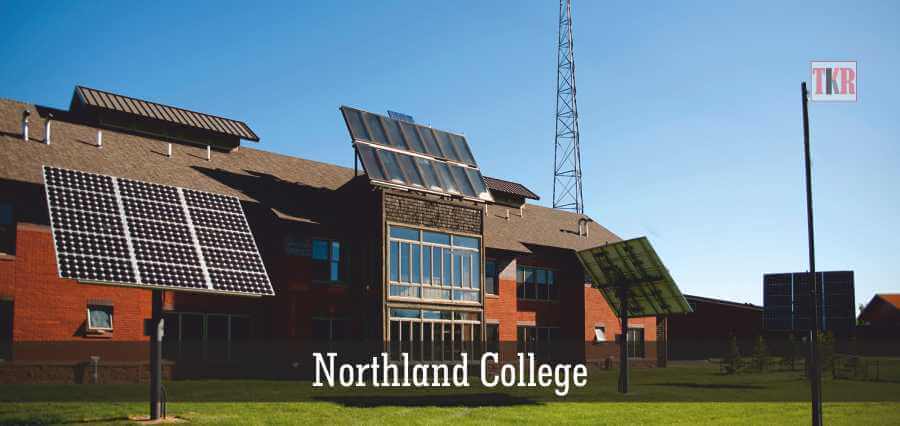The institute integrates liberal arts studies with an environmental emphasis, enabling those it serves to address the challenges of the future
With a vision to be the nation’s preeminent liberal arts college focused on the environment, preparing students and other stakeholders to lead the world toward a more sustainable, just, and prosperous future, emerged Northland College, a 126 year old Liberal Arts College Located on the shore of Lake Superior.
Founded in 1892 as a way to bring higher education to the north woods of Wisconsin, Northland serves with the mission of inclusiveness, justice, and the environment. In 1972, the college opened the Sigurd Olson Environmental Institute that focuses on citizen science and stewardship. Northland College promotes sustainability by incorporating them in the campus experience. Another interesting factor about the college is that 99% of its students receive some form of financial aid.
Interestingly, at Northland College, students are fed organic, local food (46 percent of its campus dining food budget is spent on purchasing food within 100 miles), and they grow some of their own through their campus garden program. Their food waste is composted and returned to the soil. The institute has a bike shop, reuse center, vending machines that serve up local sodas in glass bottles. And, it has campus gardens, and recently became an affiliate of Bee Campus USA.
Northland’s contribution towards a greener world has earned it a membership of EcoLeague, a consortium of six colleges and universities that share missions based on environmental responsibility and social change. Recently, it has earned a STARS Gold rating in recognition of its sustainability achievements from the Association for the Advancement of Sustainability in Higher Education (AASHE). It was even ranked as one of the top-10 undergraduate institutions in the world for overall sustainability, rating second in the academic category, focused on the curriculum and research.
An Amazing Location that Motivates the Students of Northland
Northland College is located next to Lake Superior, the largest freshwater lake in the world. Lake Superior holds 10 percent of the world’s freshwater. And Northland College makes it their responsibility to monitor, protect, and create a deeper understanding of the issues that face the Great Lakes. And, to achieve that goal, the College has created the Mary Griggs Burke Center for Freshwater Innovation. Faculty, staff, and student researchers conduct research, perform beach quality monitoring, and field surveys on inland lakes. Veteran reporter Peter Annin directs the Center and is focused on scientific communication and public understanding of Great Lakes issues. He is the author of The Great Lakes Water Wars and specializes in water diversion issues.
Creating Centers of Excellence
Northland College has created centers of excellence to dig deeper in the issues that the community faces and its foundational centers are the Burke Center for Freshwater Innovation, the Hulings Rice Food Center, the Center for Rural Communities, and the Sigurd Olson Environmental Institute.
To encourage the students’ interests in sustainability Northland has created numerous academic programs like sustainable community development, water science, sociology and social justice, outdoor education, climate science, meteorology, environmental humanities, and sustainable entrepreneurship. And surprisingly, the chemistry program intrigues students in researching the synthesis and chemical recycling of plastics. Most interestingly, many of its alumni pursue leadership in sustainability—leading change in the wine industry, fashion, energy, social justice, design, and community development.
A Note from the Sustainability Leader about Northland
Aaron Schreiber Stainthorp, a 2005 graduate, who is the sustainability specialist at Jackson Family Wines, shared a note with college recently. The note says, “Northland was the best place I could have gone to college. The skills and experience I gained there helped me take a holistic ecosystem approach to understanding how complex systems interact. Both in and out of the classroom I was exposed to so many ideas that helped me understand both how the world worked and the possibilities for building better systems. Lastly, Northland embodies hands on learning in a way that both taught me so much but also empowered me to realize how much impact you can have with a few simple actions.”
About the Leader of the College
An international business leader, philanthropist and educator Marvin J. Suomi, of Los Angeles, California, joined Northland College July 1, 2018, as its 14th President. He is committed to the environmental mission of the College. Prior to joining Northland, Marvin has led Kajima International as its President and CEO for 37 years of extraordinary growth. For his extraordinary contributions, he has been awarded with multiple awards in his career. To name a few, the Council of Independent Colleges awarded Suomi the Philanthropist of the Year in 2007 for his distinguished service and generosity, the Republic of Finland conferred the honor of Knight, First Class to Suomi for recognizing his work in advancing educational opportunities in the US and abroad.
Trustee Chad Dayton, who led the presidential search committee praised Marvin and said, “Marvin is one of those rare individuals whose achievements grant him access to most any endeavor anywhere in the world.” He further added, “We are fortunate that he will apply his skills and energy to shaping the next step in Northland College’s growth.”
To Look Out For
At Northland, the student volunteers first launched the campus composting program in 1993. And still today, the compost program is lead entirely by work-study students who manage every aspect, including daily food scrap collection, monitoring the biological process, and final distribution. The finished compost is used in campus gardens and sold to local farmers and the community. This initiative has kept hundreds of thousands of pounds of food waste out of the landfill.









